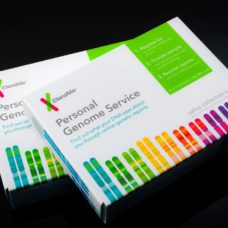Scientists claim a new genetic test can partially predict how much socio-economic success a person could attain.
Long before Darwin published “On the Origin of Species” in 1859, Jean-Baptiste Lamarck defended his own idea in 1801 of the “Theory of Inheritance of Acquired Characteristics”.
Both scientists believed that life on earth has changed, and is still changing, but based on different evolutionary mechanisms.
For Darwin, natural selection allows organisms that better adapted to their environment to survive. In short, long-neck giraffes had better chances at survival than short-neck ones that eventually died.
Lamarck, on the other hand, thought that species acquire changes then pass them on to future generations. After long necks appeared in giraffes, they were passed on to offsprings.
However, neither of them were aware of the development of genetics and modern biology that started in the second half of the 19th century.
Genetics showed that species inherit specific traits and then pass them on to their offspring through genes, but it doesn’t happen for changes that appeared in a lifetime.
A giraffe passes the long neck genes on, but if, for example, it gets its ears pierced, this trait won’t show on its offspring.
Read More: New Gene-Editing Treatment Could Replace CRISPR Technology
Tell me What Your “Polygenic Score” is, I’ll Tell you how Successful you are
Success for giraffes is basically to have a long neck that increases their survival chances.
For humans, success is more complicated. And, according to a new study, it also may depend on your genes.
For their study, researchers define success as “social mobility”, or achieving educational and economic success that translates into better income and an easier life.
The international team from the U.S, the U.K, and New Zealand analyzed genomes of over 20,000 individuals in three countries using data from five longitudinal studies.
Researchers found that individuals carrying specific genetic variants, which other studies have linked to educational success, were more likely to be socially mobile.
The team created an algorithm that calculates a genetic index they call a “polygenic score“, which indicates the number of genetic variations for each individual.
Results show that people with higher polygenic scores were more successful at getting further in their education and professional career.
High polygenic scores also seem to favor success in individuals regardless of where they come from as they can outdo their parents and siblings. However, unsurprisingly, a better-off family background does help.
Authors of the genome-wide association study explained that:
“Participants with higher polygenic scores tended to be upwardly mobile compared with their parents. Moreover, in sibling-difference analysis, the sibling with the higher polygenic score was more upwardly mobile. Thus, education GWAS discoveries are not mere correlates of privilege; they influence social mobility within a life. Additional analyses revealed that a mother’s polygenic score predicted her child’s attainment over and above the child’s own polygenic score, suggesting parents’ genetics can also affect their children’s attainment through environmental pathways.”
While socio-economic success might be written into our genes, the correlation is very low. Per the results, genetic variants account for only up to 4% in social mobility.



















Comments (0)
Most Recent